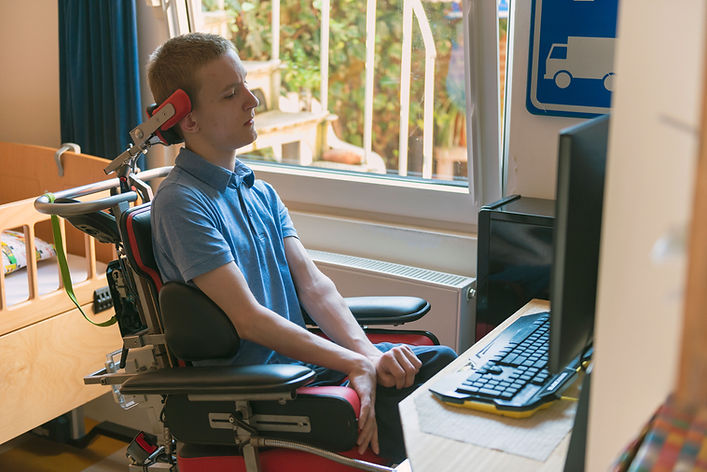
CEREBRAL PALSY (CP)
Cerebral Palsy (CP)
Cerebral Palsy (CP) is a group of permanent movement disorders that appear in early childhood. It is caused by abnormal development or damage to the parts of the brain that control movement, balance, and posture. CP affects muscle tone, coordination, and motor skills to varying degrees, and the condition may also be associated with other impairments such as vision, hearing, and cognitive issues.
The symptoms of CP vary widely from person to person, depending on the type and severity of the condition. Common signs and symptoms may include:

01. Muscle Stiffness or Rigidity
Some individuals with CP may have tight, stiff muscles that make movement difficult or awkward.
02. Spasticity
This refers to involuntary muscle spasms or contractions, which can cause jerky or stiff movements.
03. Hypotonia
Conversely, some individuals with CP may have low muscle tone, leading to floppy or weak muscles.
04. Impaired Coordination
CP can affect coordination and balance, making tasks such as walking, sitting, or grasping objects challenging.
05. Abnormal Reflexes
Reflexes may be exaggerated or absent in individuals with CP, contributing to movement difficulties.
06. Delayed Developmental Milestones
Children with CP may reach developmental milestones such as crawling, walking, or speaking later than their peers.
07. Gait Abnormalities
Walking patterns may be affected, with some individuals walking on their toes, with a wide stance, or in another atypical manner.
CP is a non-progressive disorder, meaning that the underlying brain damage does not worsen over time. However, the symptoms of CP can change as children grow and develop. Early intervention and ongoing therapy can help individuals with CP maximize their potential, improve mobility and function, and enhance quality of life. Treatment may include physical therapy, occupational therapy, speech therapy, assistive devices, medications, and in some cases, surgery.
It's important to note that CP is a lifelong condition, but with appropriate support and interventions, individuals with CP can lead fulfilling and meaningful lives, participating in activities, school, work, and social interactions.
Pimpama Physiotherapy Clinic can provide specialized care and support for clients with Cerebral Palsy (CP) through a range of tailored interventions and therapies. Here's how they can help:
01. Comprehensive Assessment
Physiotherapists at Pimpama Physiotherapy Clinic can conduct thorough assessments to understand the specific needs, challenges, and goals of clients with CP. This assessment may include evaluating mobility, muscle tone, range of motion, balance, coordination, and functional abilities.
02. Individualized Treatment Plans
Based on the assessment findings and the client's goals, physiotherapists can develop personalized treatment plans to address the unique needs of each individual with CP. These plans may include a combination of therapeutic exercises, mobility training, functional activities, and other interventions aimed at improving movement, strength, flexibility, and overall functional independence.
03. Mobility and Gait Training
Physiotherapists can work with clients with CP to improve mobility and gait patterns. This may involve exercises to strengthen muscles, improve balance and coordination, and enhance walking efficiency. Assistive devices such as orthoses, walkers, or mobility aids may also be recommended to support mobility and independence.
04. Spasticity Management
Many individuals with CP experience spasticity or muscle stiffness, which can affect movement and function. Physiotherapists can provide techniques to manage spasticity, including stretching exercises, range of motion exercises, and positioning strategies to improve comfort and mobility.
05. Functional Rehabilitation
Pimpama Physiotherapy Clinic offers functional rehabilitation programs designed to help clients with CP develop the skills needed for activities of daily living, such as dressing, grooming, and self-care tasks. Therapists can teach adaptive techniques and strategies to promote independence and enhance quality of life.
06. Pain Management
Physiotherapists can address pain and discomfort associated with CP through various modalities such as manual therapy, heat therapy, and therapeutic exercises. They can also provide education on posture, positioning, and ergonomic principles to minimize pain and prevent musculoskeletal problems.
07. Family Education and Support
Pimpama Physiotherapy Clinic offers education and support to families and caregivers of individuals with CP. They can provide guidance on home exercises, adaptive equipment, and strategies for facilitating movement and function in daily life. Additionally, they can offer emotional support and connect families with resources and support networks in the community.

Overall, Pimpama Physiotherapy Clinic provides comprehensive and holistic care for clients with CP, focusing on maximizing mobility, function, and quality of life through evidence-based interventions and personalized support.
Our Paediatric Physiotherapist has further knowledge of treating Paediatric patients with CP. Pimpama Paediatric Physiotherapy Clinic specializes in providing comprehensive care and support for infants, children, and adolescents with various developmental, neurological, orthopedic, and musculoskeletal conditions.
01. Early Intervention
Pimpama Paediatric Physiotherapy Clinic offers early intervention services to address developmental delays and motor impairments in infants and young children. They can assess motor milestones, muscle tone, movement patterns, and sensory processing to identify areas of concern and implement early intervention strategies to promote optimal development.
02. Developmental Assessments
Paediatric physiotherapists at Pimpama Clinic can conduct comprehensive developmental assessments to evaluate motor skills, gross and fine motor coordination, balance, posture, and functional abilities in children of all ages. These assessments help identify areas of strength and areas that may require intervention or support.
03. Individualized Treatment Plans
Based on the assessment findings, paediatric physiotherapists develop individualized treatment plans tailored to the unique needs and goals of each child. Treatment plans may include a combination of therapeutic exercises, activities, play-based interventions, and hands-on techniques to improve mobility, strength, coordination, balance, and motor skills.
04. Gait and Movement Analysis
For children with walking difficulties or abnormal movement patterns, Pimpama Paediatric Physiotherapy Clinic offers gait and movement analysis to assess walking patterns, identify gait abnormalities, and determine the underlying causes. This information guides the development of targeted interventions to improve walking efficiency and quality.
Overall, Pimpama Paediatric Physiotherapy Clinic is dedicated to enhancing the health, well-being, and functional abilities of children through specialized physiotherapy interventions, compassionate care, and family-centered support